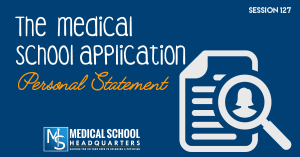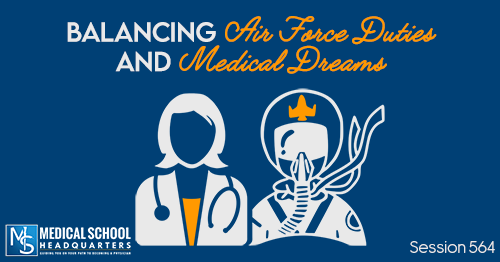Apple Podcasts | Google Podcasts
Session 127

Today’s episode is meant to help you figure out how to write your medical school personal statement.
If you have access to a great premed advisor at your university, utilize them because they know your individual circumstances a lot better than we do. But if you’re in a situation where, being a nontraditional student, you find it difficult to get access to a premed advisor or perhaps if you’re at a larger university and you’re not in touch with your premed advisor, we offer premed advising services here at Medical School Headquarters.
In this webinar, we talk about the A-Z of personal statements. There are a lot of misunderstandings about what the medical school personal statement should do, so listen to this webinar to help shed light on your questions.
The majority of personal statements do more to hurt an application than to help an application.Click To TweetWhy do we need to write a medical school personal statement?
- It’s your opportunity to expand on so much more than what the rest of your application is telling the admissions committee
- It gives you the ability to turn those numbers into a story and tell a better story than pure numbers and statistics.
- A large majority of medical school personal statements do more to hurt an application than to help an application.
- This is your golden opportunity to find your voice to speak directly to the admissions committee members.
- Numbers aren’t very expressive, but this is a chance for you to be creative and demonstrate your passions and interests.
- You get to convey what is driving you and why you want to be a doctor.
Who is the medical school personal statement for?
- You are writing to the admissions committees of the medical schools.
- They rank all applications by GPA and MCAT score, and they glance at personal statements to pick out interesting key points that could get you an interview.
- Understanding who your audience is will help you in writing your personal statement.
- Your challenge is to articulate your “why” to the admissions committee.
- Start practicing. Cut out a picture and imagine you’re talking to the admissions person, or say it out loud to other people and get feedback from them.
How long should a personal statement be for medical school?
- The limit is 4,500 characters for AACOMAS (DO schools) and 5,300 characters for AMCAS (MD schools).
- Telling your story in 4,500 to 5,300 characters is very hard.
- You need to plan how to do this and start early because you have very limited space.
When should you start writing your medical school personal statement?
You should have it done around May, so you can apply early in the application cycle. Start writing it two or three months before that.
How to draft your personal statement:
- You may have a journal that you can translate to your personal statement
- Use technology to your advantage. You don’t have to type necessarily. Dictate your personal statement and record it.
- “Write drunk and edit sober.”
- Don’t think. There is no starting point. Just start writing. Get everything out of your head. Get all your feelings out. The first draft is not supposed to be perfect.
- All the organizing and editing comes later.
How many drafts should I go through?
A lot.
How many editors do you need to look at your personal statement?
- Get as many editors as you can, those who know you and don’t.
- Give it to a practicing physician.
- Get a professional editor. Have somebody that does this for a living, not for the content but for spelling, punctuation, grammar, etc.
- Be clear with each of them about how you want them to edit it: for the content, for the organization, or for typos?
[Check out our Personal Statement Editing services.]
What’s your story?
- The beginning: How did you get here?
- The end: Getting to medical school
- Show them what you’re doing.
- Let the words come to life.
- Show them your personal qualities through what you’ve done in the past.
- Share the most powerful experiences that convinced you to become a doctor or cemented this as the right path for you.
- Keeping a journal will definitely help you write your personal statement.
[Check out our Personal Statement Writing Course.]
Common mistakes with medical school personal statements:
Here are some of the mistakes we see premeds making over and over with their personal statements:
Grammatical errors
- Do the editing 3 or 4 times.
- Be very careful and have others read it through.
- Use commas and semicolons properly.
Being very long-winded
- Editing can fix this.
- Personal statements should not be a blow-by-blow account of your life. It’s not about telling your entire life story.
- Pick out the most transformative, crucial experiences of your premed path, and allow the admissions committee to experience those with you.
[Related episode: 5 Biggest Medical School Personal Statement Mistakes]
Failure to talk about why you want to pursue this difficult path
- Mention why you want to be a doctor.
- What are you hoping to do in the future?
- Explain your “why” in your personal statement.
Should you use the same personal statement for both allopathic and osteopathic medical schools?
Email deans at osteopathic schools to get the best answer, as each school is going to be different. But at the end of the day, it’s about sharing your story and talking about why you want to be a physician, not why you want to be a DO or MD. So it doesn’t really matter. Generally, yes, you can use the same personal statement.
At the end of the day, the personal statement is about sharing your story and talking about why you want to be a physician.Click To TweetHow to start
Just get everything out of your head. Just start writing it all down. Then you can mold and move things around from there. Get it out there. Just start, and it will trigger other meaningful memories you have. Pick a couple of the most meaningful experiences and start by developing those.
Links and Other Resources
- Check out my book all about the personal statement: The Premed Playbook: Guide to the Medical School Personal Statement.
- Related episode: 5 Biggest Medical School Personal Statement Mistakes
- Related episode: Writing Personal Statements for Medical School
- Need MCAT Prep? Save on tutoring, classes, and full-length practice tests by using promo code “MSHQ”
for 10% off Next Step full-length practice tests or “MSHQTOC” for $50 off MCAT tutoring or the Next Step MCAT Course at Blueprint MCAT (formerly Next Step Test Prep)!











